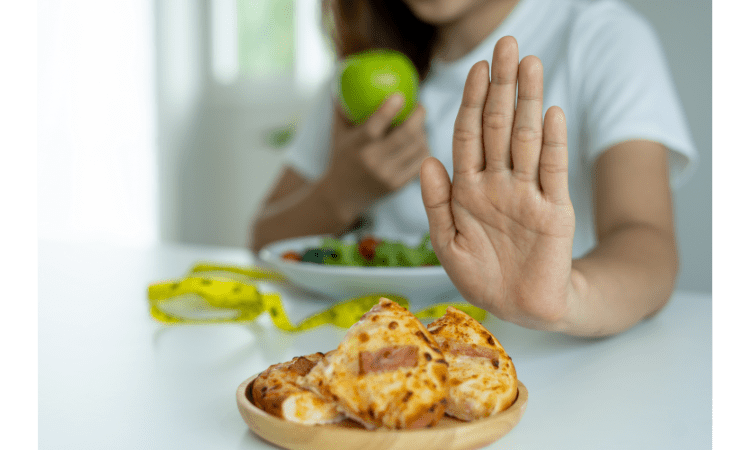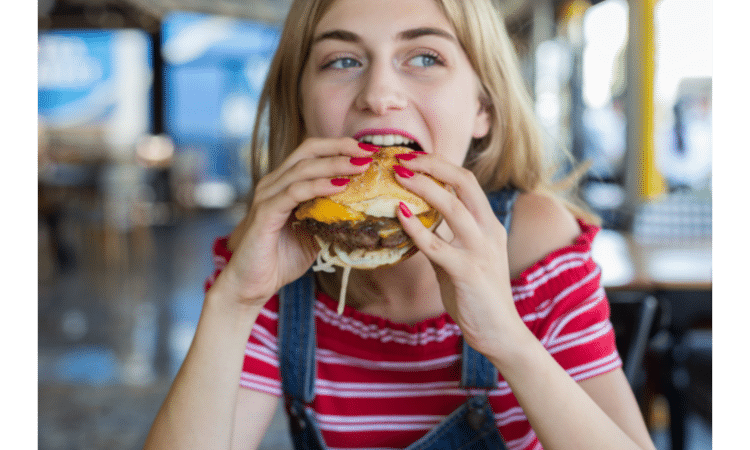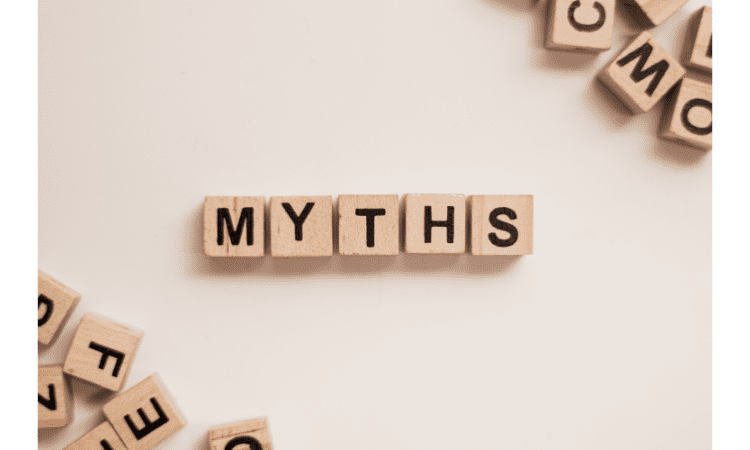
Intuitive eating is a dietary approach in which you pay attention to your body’s hunger cues, hunger and fullness signals, and treat food to gain nourishment. It’s not about dieting or counting calories—it’s about connecting with your internal cues to eat mindfully. Let us find various facts about it and also know how helpful is intuitive eating to losing weight.
What is Intuitive Eating?

The term intuitive eating was coined by dietitian Evelyn Tribole and psychologist Elyse Resch in the book Intuitive Eating after extensive studies and research. According to these authors, Its is a way of understanding food and your body that doesn’t involve restriction or rules but rather focuses on feeling longer fullness and remaining satisfied with meals.
The idea is that you can eat whatever you want in whatever quantity you want without putting yourself on a diet or restricting certain foods. It’s also not about counting calories or points—it’s about trusting your own body to know what it needs at all times when it comes to food!
Why are people worried about Intuitive Eating?

There are a lot of reasons why people are worried about Intuitive Eating. The dieting industry is a multi-billion-dollar industry, and that’s just the tip of the iceberg.
They’re built on the idea that you can’t take care or trust yourself to eat healthily, so they make up for your lack of self-control by creating restrictive diets for you and selling you packages with promises that if you follow them closely enough, weight loss will be inevitable. They also promise that if you buy their products and get enough exercise (and maybe go on some sort of “detox cleanse”), then your body will automatically shift to its “natural state”—whatever that means!
A brief history of dieting and Intuitive Eating

Dieting is not a new idea. The concept of weight loss through dieting has been around for hundreds of years given by medical experts, but it’s only been in the last century that it’s become such an integral part of our culture. There are many different kinds of diets, ranging from extremely restrictive to more moderate and flexible ways of eating.
The problem with diets is that they usually involve drastic changes in your eating habits—and the thought process behind them can be harmful too: you might think that if you aren’t losing weight fast enough, then there’s something wrong with you personally (or your body). Dieting also promotes the idea that food should be used as fuel or punishment instead of enjoyment.
It is different from dieting because it teaches us how to listen to our bodies hunger cues so we can take foods when we’re hungry without feeling guilty about what food we consume or how much we consume at meals or snacks—in other words: intuitive eating means listening to our bodies and finding a balance between food intake and activity level rather than focusing solely on calories consumed versus burned off through exercise sessions or workouts.
How do I get started with Intuitive Eating?

- Before starting, know about the process of eating properly. Start with a clean slate. Don’t beat yourself up for past mistakes, or judge yourself for what you eat. If you find that your past does influence your eating habits, try to separate the two by keeping them in different parts of your day. For example, if you’re having trouble not going straight from work to the drive-thru window because it’s “the only time” you have to eat dinner before heading home with your family, consider cooking and eating breakfast at home first before heading out on the road.
- Don’t try to change your eating habits overnight! Setting realistic goals will help keep things feeling manageable as well as prevent burnout or frustration down the line when we’re trying something new (and feeling overwhelmed). If all else fails and we feel like we’re spinning our wheels without any traction on this journey towards intuitive eating—or just need some encouragement along our way—then reach out and ask for help! Support groups exist online where people share their stories about how they got started eating intuitively; finding someone who understands where we are now can help us see how far we’ve come since those early days when making fruit smoothies felt like an impossible task!
The 10 Principles of Intuitive Eating
Know all about intuitive eating with these 10 principles. They are:
- The process is not about dieting. It’s about listening to your body and learning to honor your hunger and fullness cues.
- It is not about depriving yourself of foods you love or believe are bad for you.
- This is not about counting calories or obsessing over how many grams of fat a food has (or doesn’t have).
- It is not about feeling guilty if you eat something that’s “off” your plan; it’s an opportunity to learn more about yourself, your relationship with food, and your body.
- Intuitive eating is not just for people who are overweight or clinically obese; it can be practiced by anyone who wants to find a healthier balance with food—and feel better in their bodies as a result!
- This process is not another diet fad—it’s a way of life! The principles behind the process of eating can be applied in any context: from weight loss to maintenance, from athletes to pregnant women (and beyond), from those struggling with anorexia nervosa to those living with diabetes or celiac disease… the list goes on!
- Make peace with food—stop fighting it and learn to listen to your body instead of your mind
- Get rid of the idea of good and bad foods—there are no bad foods, just healthy and unhealthy choices
- Don’t weigh yourself more than once a week or keep track of calories; instead, focus on eating mindfully and intuitively to meet your body’s needs at any given moment
- Honor all the ways food serves you (e.g., physical nourishment, emotional satisfaction). No need to choose one over another—they’re both important! This principle helps us remember that we can have our cake (or pizza slice) too!
Is intuitive eating dangerous?
intuitive eating is not dangerous, but it can be difficult.
If you’re new to this or do not have any prior experience, you may think that you need to count calories and restrict your food intake. However, the opposite is true. Intuitive eating will help you learn how to listen to your body’s cues and eat when you’re hungry, stopping when you’re full.
This can take some getting used to. You may find yourself eating more than usual or feeling hungry more often than normal—both of which are normal parts of the process!
Also Read: – Eating Late Night is Really Bad for Body.
Is intuitive eating really beneficial?
In a word: yes. The idea behind intuitive eating is that a person should eat when they’re hungry, stop when they’re full, and listen to their body’s signals about what it needs. By doing this, people will be better able to meet their nutritional needs and avoid overeating.
The benefits of intuitive eating include:
* A greater feeling of satisfaction with meals
* Intuitive eating to lose weight.
* More stable blood sugar levels
Myths about intuitive eating

Intuitive eating is a great way to lose weight, but you may have heard some myths about it. Here’s what you need to know:
Myth #1: Intuitive eaters don’t count calories.
Not true! Intuitive eating doesn’t mean that you should completely ignore calories or macros. It just means that you shouldn’t obsess with counting them or creating a rigid food plan based on them. Instead, focus on listening to your body’s hunger cues and creating balance by eating whole foods in appropriate amounts. Infact people follow intuitive eating to lose weight.
Myth #2: Intuitive eaters are never hungry or never full.
It’s possible for an intuitive eater to be hungry at times, or even feel full—but this isn’t a problem! This is totally normal because our bodies are always working to keep us at an optimal weight and health level, so they’ll naturally change according to what we’re doing (for example, exercising more often means we’ll probably get hungrier more often). But it also means that if something changes (like starting an exercise program), then our bodies will adjust accordingly—meaning that the hunger signals won’t always be there for the same reasons as before!
What is the difference between intuitive eating and mindful eating?

The two terms are often used interchangeably, but there is a difference. Mindful eating is the practice of being aware of the food you eat and how it makes you feel. It’s about paying attention to where your food comes from, how and when you eat it, as well as how full or hungry you are before and after a meal.
While intuitive eating also focuses on self-awareness around food choices and consumption, it puts an emphasis on listening to your body rather than rules or external cues—like scales or weight loss goals—to guide healthy eating decisions.
Both techniques can help improve your relationship with food if practiced consistently over time.
Getting started with intuitive eating can be a journey, but if you really know all about it then learn to eat in a healthy way without dieting.
Intuitive eating is about listening to your body and eating in a way that feels right for you. It is not about following any particular set of rules or guidelines, nor does it have anything to do with calorie counting or restricting certain types of foods. Intuitive eaters are aware of what they need for their body at each point in time, and they eat accordingly—they may choose to eat more or less than usual depending on what their bodies tell them they need at the moment. The only rule when practicing intuitive eating is: Trust yourself!
Conclusion
Intuitive Eating is a way to eat that allows you to listen to your own body and respond accordingly. This can take a lot of practice and patience, but it’s worth it. When you start listening to yourself more, you will feel much better physically, mentally and emotionally! intuitive eating is really helpful to lose weight.
Also Read : – Women over 40 should avoid these health habits











